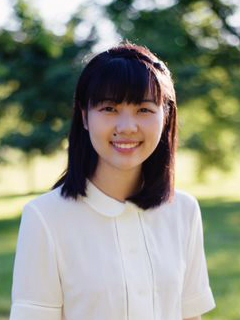2017 International Student Scholarship, 2021 New Investigators Research Grant
The Fourth (Language) is the Charm This Time
 Pumpki Lei Su, recipient of a 2017 ASHFoundation International Student Scholarship and a 2021 ASHFoundation New Investigators Research Grant, is officially trilingual. Mandarin is Su’s mother tongue (and Shanghai her home city) and, as a bilingual speech-language pathologist, of course she’s fluent in English. To add another linguistic feather in her cap, as an undergraduate at Northwestern University, along with her major in Linguistics and Communication Sciences and Disorders, she earned a minor degree in French Language and Literature. That’s three.
Pumpki Lei Su, recipient of a 2017 ASHFoundation International Student Scholarship and a 2021 ASHFoundation New Investigators Research Grant, is officially trilingual. Mandarin is Su’s mother tongue (and Shanghai her home city) and, as a bilingual speech-language pathologist, of course she’s fluent in English. To add another linguistic feather in her cap, as an undergraduate at Northwestern University, along with her major in Linguistics and Communication Sciences and Disorders, she earned a minor degree in French Language and Literature. That’s three.
But it’s the fourth (in this case, unofficial) “language” that has been occupying much of Su’s professional interests lately—“parentese,” the unique speaking style that many parents adopt when talking to their babies, using exaggerated sounds and simpler sentences.
“The majority of research in this area is with a monolingual population,” Su explains. “I’m interested to see if the beneficial effect of parentese on early language learning generalizes to other populations as well, for example, bilingual populations. In children growing up learning two languages, their language input is distributed in the two languages. And so is their language knowledge, which also influences the input they receive. It’s important to look at both the input of language and the child’s language knowledge because they influence each other and collectively influence the child’s language learning.”
Su, who holds a PhD in Hearing and Speech Sciences from Vanderbilt University and is currently an Assistant Professor at The University of Texas at Dallas, is hoping her work will help improve long-term language outcomes in both multilingual children and children with language delays and disorders. Her current work also examines language learning and parent-child interaction in bilingual children and children with autism spectrum disorder. In the long run, she hopes to gain a deeper understanding of malleable factors during parent-child interaction that optimize language outcomes in diverse groups of children who struggle to learn language.
Su’s interest in early language learning across populations comes with challenges specific to her research. The availability of basic tools for scientific inquiry in Mandarin, for example, are limited, which seriously impedes studies in this area. Determined to bridge the gap with her own work, Su is also involved in work that would perform a service to speech and hearing sciences that goes far beyond her current study. As she carries out her research, Su hopes to contribute to this critical need by developing new tools to assess language in Mandarin-speaking children.
As an international scholar, Su is particularly grateful to the ASHFoundation for giving her the pat on the back that has “empowered,” her, she says, “and allowed me the confidence to know that I’m on the right track.” For international students who are often not eligible for federal training grants or scholarships, “even the application process itself was valuable,” she adds, “and enabled me to practice and refine my grant-writing skills. This funded project will also allow me to collect pilot data to submit a future research grant to the NIH for additional funding.”
Especially, though, says Su, “It’s my great pleasure to be part of the ASHFoundation community. That feeling continues to inspire my work. I know I’m supported and appreciated.”
View More Recipient Spotlights